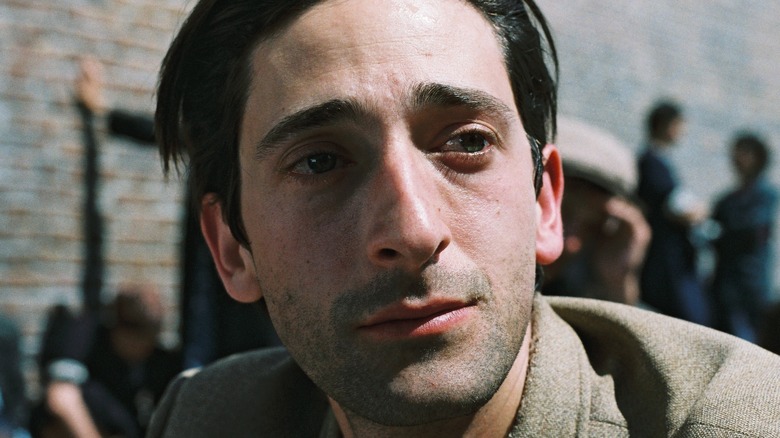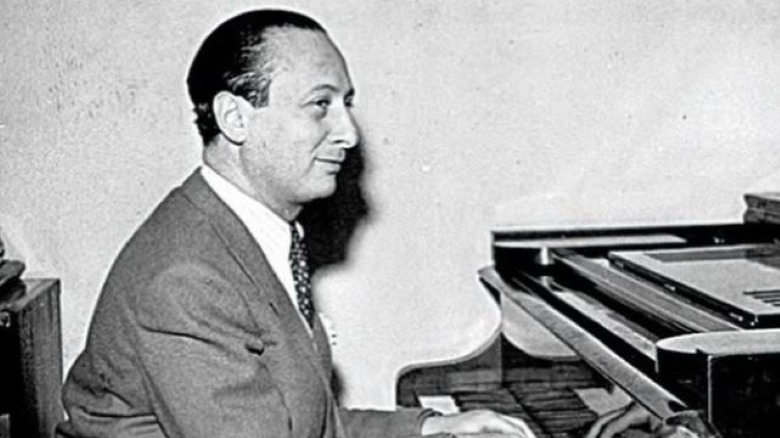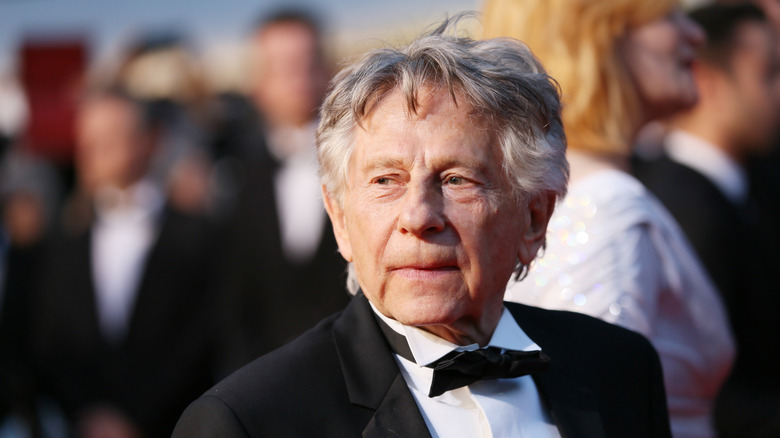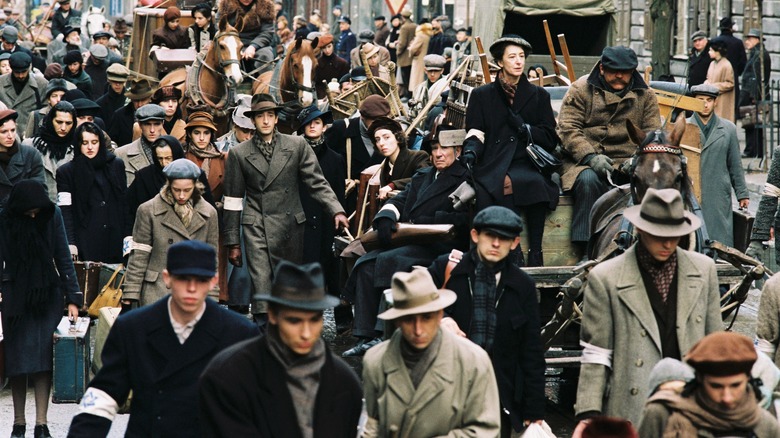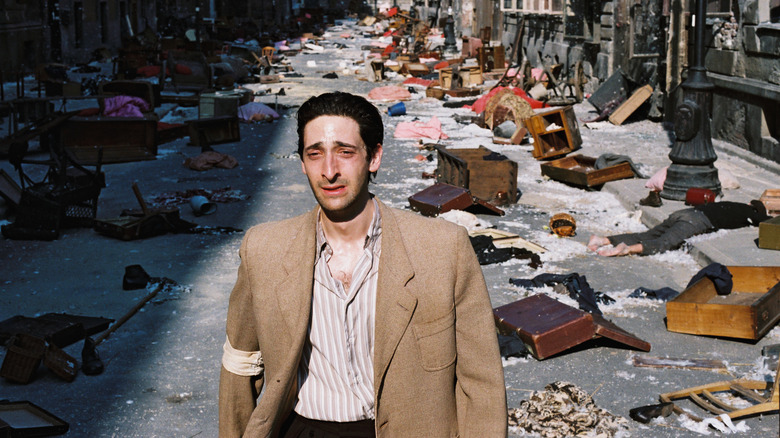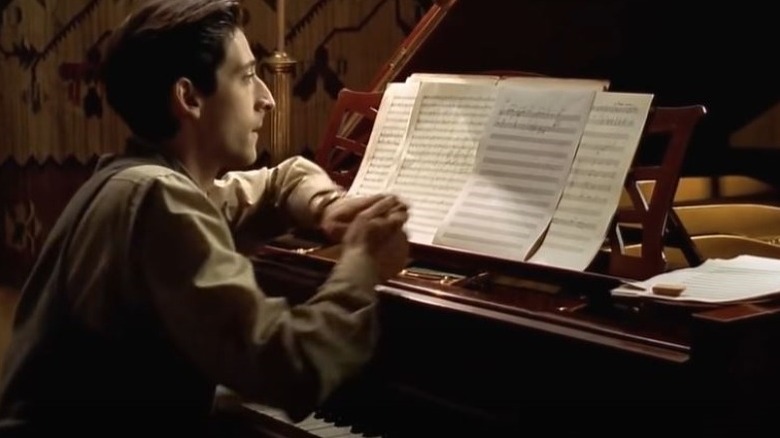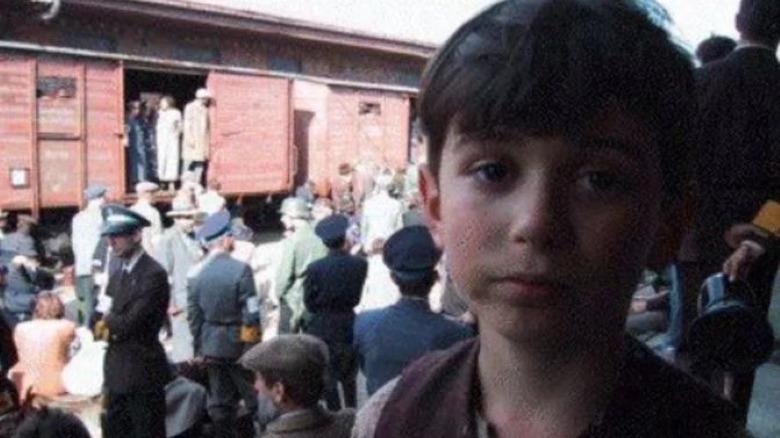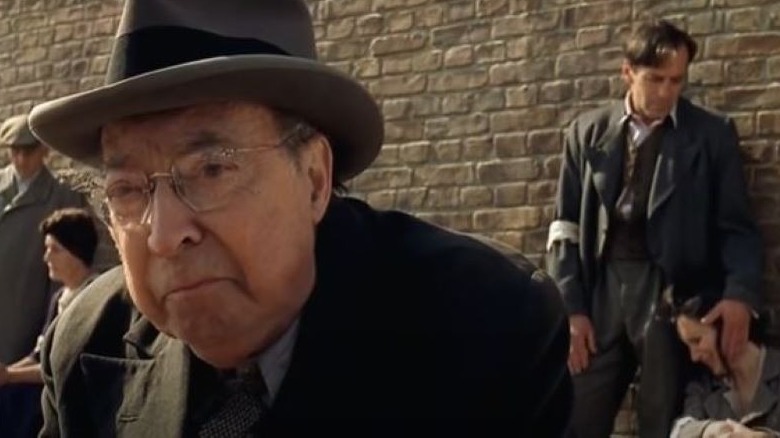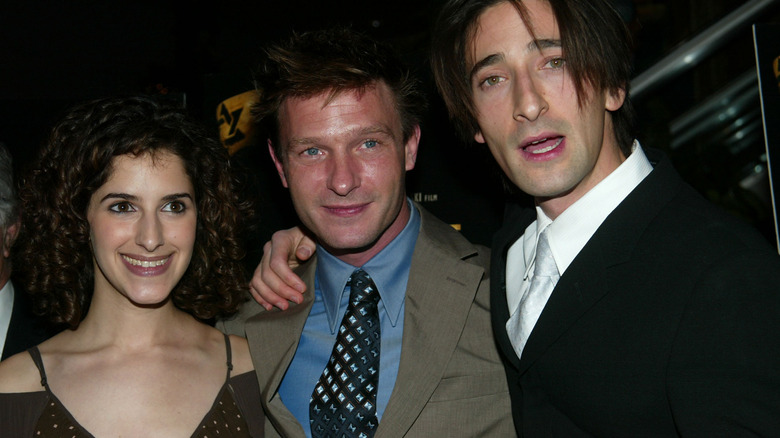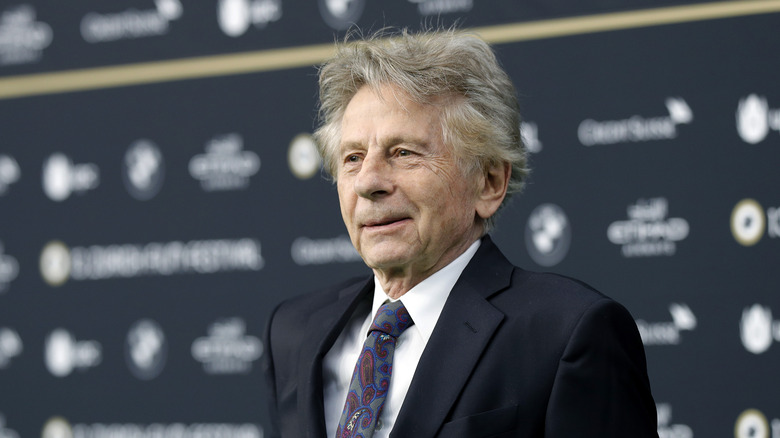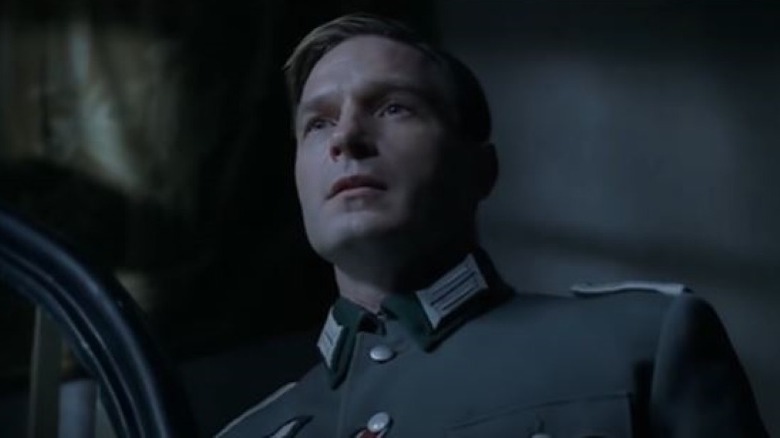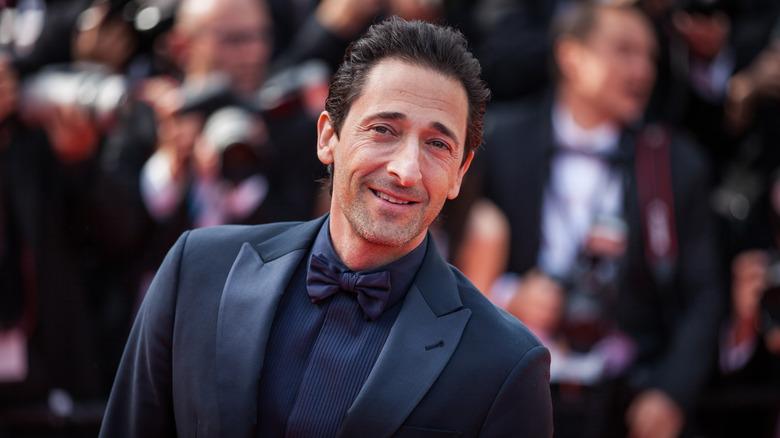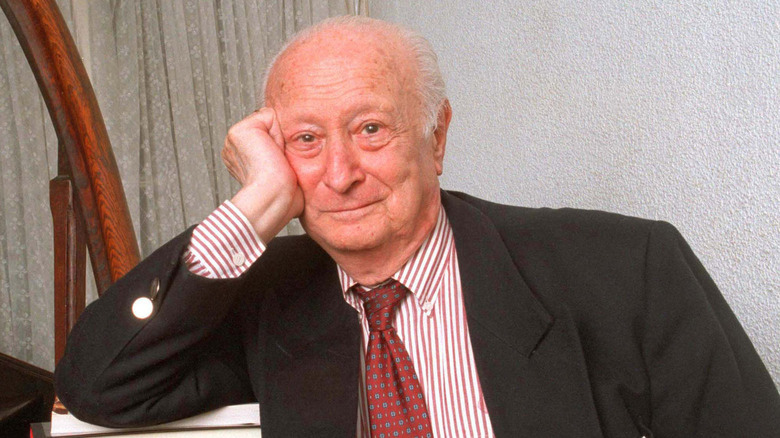Details About The Pianist That Will Make Fans Love The Film More
When "The Pianist" landed in theaters in 2002, it became one of the most celebrated films of a generation.
The biographical drama, following the true-life tale of Polish-Jewish concert pianist Władysław Szpilman and his harrowing tale of survival during the Holocaust, came from celebrated-but-controversial filmmaker Roman Polanski and catapulted star Adrien Brody to the top of casting agent's wish lists. Based on Szpilman's autobiography of the same name, "The Pianist" won audiences and critics over with an honest, heart-tugging depiction of war, humanity, and the transcendent power of art.
From the early days of the Nazi invasion of Poland to the inhumane treatment of the Jewish citizenry to the anticipatory final days of the war, "The Pianist" offers its audience a candid glimpse at one of the most cruel events in human history, through the eyes of one inspirational victim. Without asking for sympathy, it remains brutally truthful.
Today, "The Pianist" remains in any discussion of the best films of the 21st century. It's an all-time best performance by Brody, and quite possibly the best film from Polanski. But there is much more to be learned beyond its 150-minute runtime, including the fate of its real-world heroes, a difficult development process, and the controversial legacy left behind by of one of cinema's most valuable explorations of mankind's darkest chapter.
The real Szpilman passed away during pre-production
"The Pianist" explores how an artist survived terrifying experiences through luck, perseverance, and the goodwill of a music-loving German captain. Władysław Szpilman overcame insurmountable odds on numerous occasions, as explored throughout the film and within his autobiography.
Although Szpilman is most often recognized for his traumatic tale of survival during the war, he had an accomplished career as a composer and performer of classical and jazz music. In Poland, Szpilman was an award-winning musician with over 100 popular songs, many written for children. The prolific pianist went on to become the director of the popular music department of the same Polish radio station he is seen performing at during the introduction and conclusion of the movie.
Sadly, Szpilman never lived to see the film that would make him famous the world over. On July 6, 2000, as "The Pianist" was in development, Władysław Szpilman died of natural causes. Beyond his story being immortalized in film, a commemorative plaque was installed in Warsaw, recognizing Szpilman's perseverance. Additionally, the studio at Polish Radio, where the musician worked for nearly three decades, was renamed after him in 2011.
Roman Polanski's connection to the story
The controversy surrounding Roman Polanski began long before the accomplished director took on the project of adapting Szpilman's story. Although he had been working steadily, for better or worse, "The Pianist" represented a comeback.
By the time "The Pianist" was released, the director had been a fugitive from the United States for over twenty years. In 1977, Polanski was indicted on six counts of criminal behavior (including rape) against a 13-year-old; after pleading not guilty, Polanski agreed to a plea bargain (pleading guilty only to "unlawful sexual intercourse with a minor"), believing the result would be time served and probation. When Polanski learned that the judge planned to disregard the plea deal and sentence Polanski to decades in prison, he fled — and has lived mostly in France ever since, avoiding countries where he could be returned to the US, and protected from extradition as a French citizen.
Although he had almost certainly made his best films ("Rosemary's Baby," "Chinatown") before fleeing the US, Polanski had managed to remain relevant, successful, and able to attract names like Johnny Depp, Hugh Grant and Harrison Ford for such films as "Frantic," "Bitter Moon" and "The Ninth Gate."
Bypassing the uncomfortable nature of his ongoing legal troubles, the director was an appropriate choice to head "The Pianist," having a personal connection to the subject matter. Polanski was himself a survivor of Nazi-invasion Poland during World War II. A young child at the time, he managed to find safety with a Polish farmer, although he lost his mother and his father barely survived. As such, the director put much of himself into "The Pianist."
"Polanski, in talking about his own experiences, has said that the death of his mother in the gas chambers remains so hurtful that only his own death will bring closure," Roger Ebert wrote in his review. "By showing Szpilman as a survivor but not a fighter or a hero —as a man who does all he can to save himself, but would have died without enormous good luck and the kindness of a few non-Jews — Polanski is reflecting, I believe, his own deepest feelings: that he survived, but need not have, and that his mother died and left a wound that had never healed."
Further investing himself, Polanski had a hidden role in the movie, doing voiceover work for the character Jurek. In addition, the film marked the first credited performance by the director's daughter, Morgane Polanski.
If you or anyone you know has been a victim of sexual assault, help is available. Visit the Rape, Abuse & Incest National Network website or contact RAINN's National Helpline at 1-800-656-HOPE (4673).
Over a thousand actors auditioned
Unsurprisingly, one of the biggest undertakings of bringing "The Pianist" to the screen was finding the right actor to portray Szpilman. Polanski had a specific vision, and his first choice for the lead role was "Shakespeare in Love" actor Joseph Fiennes, who opted instead to return to the theatre.
Polanski then turned to the public, holding an open audition in London for men aged 25-35, with talent at the piano. Over 2000 aspiring actors turned out for the one-day auditions, where casting director Celestia Fox claimed afterwards that "Roman had thought he might find the right person, an unknown."
Ultimately, the open call failed to find a star. Empty-handed, Polanski returned to America's roster of established actors to find his cinematic version of Szpilman in Brody, who had been in films for well over a decade, but whose star was suddenly rising after scene-stealing work in Barry Levinson's "Liberty Heights" and Spike Lee's "Summer of Sam."
Brody's extreme methods to become Szpilman
Brody, of Jewish-Polish descent, felt a responsibility when taking on the role of Szpilman. As such, he underwent extreme preparation methods to become a Holocaust survivor.
Cutting himself off from his life, Brody separated from his then-girlfriend, also giving up his car and apartment. Brody spoke about such personal sacrifices with the BBC in 2003. "The beauty of what I do," he said, "it gives you the opportunity to give up who you are and attempt to understand someone else."
So, the actor stripped himself to the basics in an ultimate move of Method acting. "I took two bags and my keyboard," he explained, "and moved to Europe."
The actor's body was also modified to emulate a Szpilman who nearly starved to death, scavenging for food in the bombed ruins of Warsaw. Living on a crash diet, the six-foot-five-inch actor lost 30-pounds over six weeks, weighing in at 130 pounds at his slenderest.
"There is an emptiness that comes with really starving," said Brody, "I've experienced loss, I've experienced sadness in my life, but I didn't know the desperation that comes with hunger." Even after the release and subsequent success of "The Pianist," Brody admitted in a 2017 interview that he suffered from depression brought on by his Oscar-winning performance. "I was very disturbed by what I embraced in making that film, and of the awareness that it opened up in me."
Brody learned how to play piano for the role
To authentically play the Polish composer, Brody had to pay close attention to the music. Polanski turned to Polish musician Janusz Olejniczak to handle the brunt of the movie's musical performances; his hands can be seen in many of the close-up visuals of Szpilman playing piano. But even a world-class pianist could not fully satisfy Polanski, who insisted upon scenes of his lead actor playing Chopin's Nocturne in C-sharp minor.
When casting began for "The Pianist," initial hopes were that the lead actor would be able to perform many of the musical compositions. Brody was a novice on the piano, however, and had embarked on the near-starvation diet that would give him the look he needed to play Szpilman, but left him with very little energy.
Nevertheless, Brody practiced piano for four hours a day. Many of the shots within the film showcase Brody performing the classical compositions — however, all the music was dubbed over with Olejniczak's more refined work.
Szpilman's real-life grandson appears in the movie
Szpilman lost his entire family during the Holocaust — but there is one face in "The Pianist" that defiantly reminds us that their legacy lives on.
The last time Władysław Szpilman saw his parents, brother, and two sisters, they were being loaded on a train to the Treblinka extermination camp in 1942 while he was forced to remain in the Warsaw ghetto. In the years following the war, Szpilman found love — marrying his wife in 1950, with whom he had two children. Władysław's son, Andrzej Szpilman, followed his father's footsteps in becoming a music composer himself, and would also be responsible for much of his father's success with his memoir. Family was always an important part of Władysław Szpilman's life, especially after suffering such an immense loss.
It's only appropriate, then, that Władysław's grandson would receive a minor role in the movie about his extraordinary grandfather's life. Daniel Szpilman makes a brief appearance in the film; he can be glimpsed in the scene that depicts the day Władysław lost his family.
It was Cyril Shaps' final movie performance
"The Pianist" did not have much of a name-brand cast; even Brody was hardly a household name.
The film does, however, include many seasoned performers from a diverse range of acting backgrounds. The roles of Szpilman's parents went to veteran entertainers with decades of experience in Maureen Lipman ("Coronation Street") and Frank Finlay ("The Three Musketeers"). Meanwhile, the part of the Nazi Captain who empathizes with the main character's musical talents, Wilm Hosenfeld, was delivered by Thomas Kretschmann, who went on to appear in "Avengers: Age of Ultron" and "King Kong."
Not to be overlooked is the old man in the concentration camp alongside the Szpilman family (Mr. Grün), played by actor Cyril Shaps. At the age of 78, "The Pianist" was Shaps' final role before his passing. Although best known as a character actor, Shaps' filmography included nearly 200 credits. He had multiple parts in the original "Dr. Who" series, and Shaps can also be found in the James Bond film "The Spy Who Loved Me," as well as delivering the voice of Mr. Gruber in "The Adventures of Paddington Bear." Fittingly, Cyril Shaps' final role holds special meaning — he had been born to Polish-Jewish parents.
The movie's Hollywood premiere was ruined
Understandably, one of the biggest nights for any feature-length film is its big Hollywood premiere. A glittering evening of celebrities and elegance, film debuts in Los Angeles are renowned for their opulence and revelry.
By December of 2002, "The Pianist" had already debuted at the Cannes Film Festival and had screenings in Poland and France that had established it as an awards season contender. Still, a Hollywood premiere sets the pace for a successful box office release in North America, giving critics and influencers the first looks at a new production.
Focus Features, a new art house label for Universal Pictures, had invited hundreds of guests to take in the film, with the evening serving as a benefit for the Los Angeles Jewish Symphony and the National Foundation for Jewish Culture. Unfortunately, sound problems made headlines and ultimately ruined the premiere for 650 invited guests.
Jack Nicholson, Fran Drescher, Lara Flynn Boyle, Martin Landau, and stars Adrien Brody and Thomas Kretschmann were among those in attendance. In addition to the film's sound problems, the faulty technology garbled a speech from Władysław Szpilman's son. Ultimately, the screening was canceled and complimentary tickets were given to a future screening and a future Jewish Symphony performance.
Brody reflected on his disappointment in an interview with Entertainment Weekly, saying, "Jack Nicholson was there. I really wanted Jack to see my movie." But he was also able to keep things in perspective: "Because of my understanding of the level of suffering that Szpilman endured," he said, "in the greater scheme of things, this means nothing."
The film's international acclaim
There was something both groundbreaking and magical in how Brody and company were able to connect to Szpilman's story, and the results were there on the screen.
"The Pianist" was an international production, spanning multiple European countries. The majority of the filming was completed in Poland and Germany, with post-production being done in France. As such, the movie's international success was arguably more valuable than how it was received in North America. Thankfully, "The Pianist" became an overnight critical darling throughout European countries.
Debuting at Cannes, the movie walked away with the highest prize, the Palme d'Or. Additionally, "The Pianist" is the only English-speaking film awarded Best Film at France's Cesar Awards. In 2016, the film was included on BBC's 100 Greatest Films of the 21st Century list. Subsequently, in Poland, it is considered one of the greatest movies to come out of the country while remaining one of Polish-native Polanski's most recognized works. Not only is "The Pianist" the only film to earn Polanski best director at the Academy Awards, but he also describes it as his best work.
German Captain Wilm Hosenfeld was posthumously honored
It is a heart-stopping moment when Szpilman is finally caught red-handed by a Nazi captain. Certainly, for the real-world Szpilman, he must have thought his fight was over. But German Captain Wilm Hosenfeld was much more generous and understanding than many of his brethren.
As seen in the film, upon learning about Szpilman's skills with the piano, the captain defers and even helps to feed the starving local and grant him safety — as best as he can offer. It is one of the most warm scenes in a film that can be otherwise difficult to swallow. And thanks to the memoirs of Szpilman, and the success of the subsequent film, many have recognized Captain Hosenfeld for his compassion.
Unfortunately, the real Hosenfeld died in Soviet captivity during the war. Survived by his son and encouraged by Władysław's son Andrzej Szpilman, Hosenfeld has received some posthumous commendations. In 2007, he was awarded the Commander's Cross of the Order of Polonia Restituta by then-Polish President Lech Kaczyński. Additionally, he earned The Righteous Among the Nations recognition from Yad Vashem, an official memorial to the victims of the Holocaust. Finally, in 2011, a commemorative plaque was placed in Warsaw, Poland, where Hosenfeld and Szpilman first met, honoring his moment of compassion.
Brody became the youngest person to win the Academy Award for Best Actor
Brody's efforts in making personal sacrifices, learning to play piano and transforming his body ultimately paid off. The actor received a plethora of nominations and became an awards season juggernaut, winning a Golden Globe, Screen Actors Guild award, and the Polish Academy Award for best actor.
At age 29, Brody would eventually become the youngest actor to receive an Oscar for best actor, a distinction which still stands today. He also would accept the award with a rapturous kiss that would go down in Oscar history, as presenter Halle Berry became an unexpected recipient of Brody's in-the-moment enthusiasm.
What few realize, however, is that much of this almost didn't happen. Ahead of the annual ceremony, actors Jack Nicholson, Nicolas Cage, Michael Caine, and Daniel Day-Lewis reportedly had a secret discussion about boycotting the Academy Awards to protest the US invasion of Iraq.
"I said, 'I don't know about you guys, but I'm going,'" Brody said while remembering the moment in a 2022 interview. "This doesn't come around too often. I know you guys are all winners, you can sit it out, but I can't.'"
Szpilman was wrongfully accused of being a Nazi collaborator
While Szpilman's story has given audiences a harrowing glimpse at what life was like for Jewish citizens of Poland during the Nazi invasion, it has also inspired its share of critics.
In 2010, Agata Tuszyńska published a book collecting interviews with singer/actress Wiera Gran, a fellow Polish survivor who had similarly escaped from the Warsaw ghetto alongside Szpilman. After fleeing Poland, Gran was rumored to have collaborated with Nazis during the invasion.
In Tuszyńska's book, "Vera Gran: The Accused," she details Gran's accusations that Szpilman was the collaborator, responsible for sending thousands of Jews to concentration camps. Understandably, the allegation against Szpilman received outrage from fans, as well as the musician's family.
"She was jealous of my father's success and tried to harm him with false accusations," Andrzej Szpilman said of Gran's claims. "Can you imagine him being a collaborator and not trying to hide his real identity?" Ultimately, the surviving Szpilman family won a court appeal against the book's author and publisher, earning a public apology and omission of the harmful statements in future publications.
